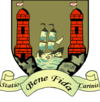City of Cork
|
Cork Corcaigh |
|||
|---|---|---|---|
| City | |||

From top, left to right: City Hall, the English Market, Quadrangle in UCC, River Lee, Shandon Steeple.
|
|||
|
|||
| Nickname(s): The Rebel City, Leeside, The Real Capital | |||
| Motto: Statio Bene Fida Carinis (Latin) "A safe harbour for ships" |
|||
| Coordinates: 51°53′50″N 8°28′12″W / 51.89722°N 8.47000°W | |||
| State | Ireland | ||
| Province | Munster | ||
| County | Cork | ||
| Founded | 6th century AD | ||
| City rights | 1185 AD | ||
| Government | |||
| • Type | Cork City Council | ||
| • Lord Mayor | Tony Fitzgerald, FF | ||
| • LEAs | 6 | ||
| • Dáil Éireann | |||
| • European Parliament | South | ||
| Area | |||
| • City | 37.3 km2 (14.4 sq mi) | ||
| Population (2016) | |||
| • City | 125,622 | ||
| • Density | 3,367.88/km2 (8,722.8/sq mi) | ||
| • Urban | 208,669 | ||
| • Metro | 399,216 | ||
| • Demonym | Corkonian, Leesider | ||
| Time zone | WET (UTC0) | ||
| • Summer (DST) | IST (UTC+1) | ||
| Eircode | T21 and T23 | ||
| Area code(s) | 021 | ||
| Vehicle index mark code |
C | ||
| Website | www.corkcity.ie | ||
| Main immigrant groups, 2011 | |
| Nationality | Population |
|---|---|
|
|
6,822 |
|
|
3,075 |
|
|
1,126 |
|
|
960 |
|
|
866 |
|
|
824 |
|
|
640 |
|
|
543 |
|
|
523 |
|
|
520 |
Cork (/kɔːrk/; Irish: Corcaigh, pronounced [ˈkoɾkɪɟ], from corcach, meaning "marsh") is a university city in south-west Ireland, in the province of Munster, which had a population of 125,622 in 2016.
The city is situated on the River Lee which splits into two channels at the western end and divide the city centre into islands. They reconverge at the eastern end where the quays and docks along the river banks lead outwards towards Lough Mahon and Cork Harbour, which is one of the largest natural harbours in the world by navigational area.
Founded by Viking invaders around 915, the city's charter was granted by Prince John, as Lord of Ireland, in 1185. Cork city was once fully walled, and the remnants of the old medieval town centre can be found around South and North Main streets.
The city's cognomen of "the rebel city" originates in its support for the Yorkist cause during the English 15th century Wars of the Roses. Corkonians often refer to the city as "the real capital" in reference to its role as the centre of anti-treaty forces during the Irish Civil War.
Cork was originally a monastic settlement, reputedly founded by Saint Finbarr in the 6th century. Cork achieved an urban character at some point between 915 and 922 when Norseman (Viking) settlers founded a trading port. It has been proposed that, like Dublin, Cork was an important trading centre in the global Scandinavian trade network. The ecclesiastical settlement continued alongside the Viking longphort, with the two developing a type of symbiotic relationship; the Norsemen providing otherwise unobtainable trade goods for the monastery, and perhaps also military aid.
...
Wikipedia



